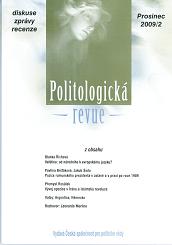Volby v Argentině 2009: Dochází ke změně stranického systému?
Elections in Argentina 2009: Is there a change of the party system underway?
Author(s): Andrea HeroutováSubject(s): Politics / Political Sciences
Published by: Česká společnost pro politické vědy
Keywords: Argentina; democratic elections; party system; PJ; UCR
Summary/Abstract: Argentina went through different types of authoritarian regimes during 20th century but since 1983 there has been consolidated democratic regime that is based on federalism and presidential system. The typical feature of the newly formed party system in Argentina was alternation of the two main nationwide parties – Unión Cívica Radical (UCR) and Partido Justicialista (PJ). This trend has not been present only on the national level but also on the regional one. All presidents of the 1983-2009 period belonged to one of these parties. In the parliamentary elections 2003 and 2007 UCR had lost important percentage of votes in favour of new political parties and couldn’t work as an alternative opposition party towards PJ. The dominancy of PJ, since 2003 without strong opposition (in both parliamentary chambers PJ had absolute majority), was fixed until the last parliamentary election in June 2009 when both chambers were partially renewed. PJ lost support of voters in favour of new coalition Acuerdo Cívico y Social (UCR is a member of this wide coalition), and it lost absolute majority of deputies and senators. The threat that PJ would become a hegemonic party did not happen. It seems now that the party system moves in the direction of the moderate multi-partism.
Journal: Politologická revue
- Issue Year: 15/2009
- Issue No: 2
- Page Range: 73-80
- Page Count: 8
- Language: Czech
- Content File-PDF

